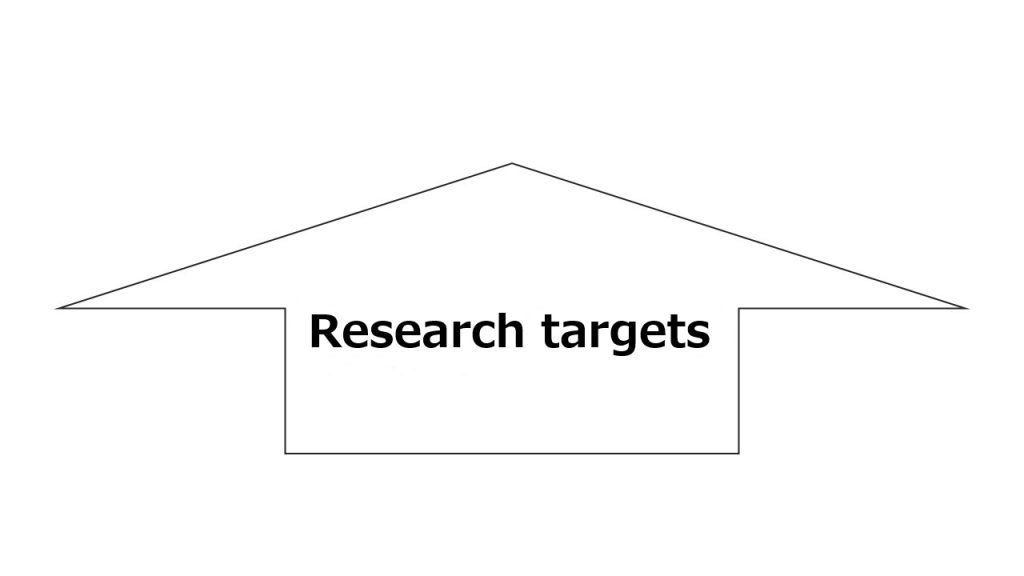The CCPID is conducting research on infectious diseases in the eight departments to clarify the three tasks and proceed with development in the three areas.
Three tasks to be clarified
How do viruses replicate? How do viruses cause disease? Where do Viruses emerge,and how do they spread? We will clarify the process and mechanism by which BSL-4 pathogens enter, replicate within, and progress to the release of progeny virions outside the cell through the interaction of viral and cellular factors. We will clarify how BSL-4 pathogens infect humans and cause disease by research using cells and experimental animals. It is crucial to detect and respond to outbreaks quickly to take effective measures against them. We will clarify the outbreak areas, epidemic periods, environmental factors, natural and intermediate hosts, and transmission routes.
Three areas for research and development
Testing and diagnostic strategies Vaccines Therapeutic drugs Early diagnosis of diseases caused by BSL-4 pathogens is critical for preventing the spread of infection and saving patients' lives. We are developing accurate, highly sensitive, and rapid testing and diagnostic strategies that can be used in endemic areas or at quarantine stations. Since the development of vaccines against BSL-4 pathogens is lagging, we are developing vaccines, including next-generation vaccines, with high effectiveness in preventing infection and/or disease onset and minimal side effects. There is no effective treatment for infectious diseases caused by BSL-4 pathogens. Therefore, we are developing therapeutic drugs that inhibit viral proliferation and alleviate symptoms with minimal side effects.

| Dept. Emerging Infectious Diseases | Dept. Viral Ecology | Dept. Virus Infection Dynamics | Dept. Immune Dynamics in Viral Infections |
| We are conducting basic research on highly pathogenic viruses (e.g., evolaviruses) and emerging viruses (e.g., SFTS virus). Furthermore, we are developing diagnostic systems, therapeutic drugs and vaccines for infectious diseases caused by these viruses. We are also doing research on the surveillance of viral diseases and identification of novel viruses in human and wild life in Africa, Asia, and South America. | Our research aims to elucidate the ecology of highly pathogenic zoonotic viruses in nature and develop strategies for their control. We primarily focus on arthropod-borne viruses, investigating their transmission between host species, uncovering the molecular mechanisms of pathogenesis, and developing diagnostic, preventive, and therapeutic strategies. | By using various imaging techniques, we are conducting research to elucidate the molecular basis of infection and pathogenicity expression mechanisms in filoviruses and Epstein-Barr virus, which cause serious human diseases such as hemorrhagic fever and tumors, focusing on the molecular mechanisms by which various viral proteins regulate host cell membrane dynamics and the cytoskeleton. | Investigating the host immune response elicited by viral infections is crucial for addressing public health challenges associated with infectious diseases. We conducted a study utilizing a murine model system to gain a deeper understanding of this fundamental immunological issue. Furthermore, we have advanced the development of therapeutic strategies based on our immunological insights and have contributed to vaccine development against emerging infectious diseases. |
| Dept. Medical and Applied Virology | Dept. Molecular Pathogenesis of Viral Infections | Dept. Functional Glycobiology in Infectious Diseases | Dept. Virus-Host Interaction |
| Our main research target is Arenaviruses which include Lassa virus, a causative agent of Lassa fever, and other viruses responsible for Southern American hemorrhagic fevers. Specifically, we will understand the replication mechanisms of arenaviruses at the molecular level within cells and animals. We strive to develop effective strategies for controlling arenavirus infections by elucidating their pathogenesis and identifying potential drug targets. | Our research focuses on developing countermeasures against viral infections, particularly those caused by bunyaviruses and filoviruses. To understand the pathogenesis of these viral infections, it is essential to clarify both the host response and the dynamics of the virus in infected cells. We investigate the molecular mechanisms underlying viral replication, budding pathways, cell tropism, and the host immune responses. | We are studying about viral infections that cause severe symptoms in humans, focusing on glycans and glycan-binding lectins. We would like to reveal the role of glycans on viral particles especially in zoonotic viral infections. We also try to development new anti-viral drugs targeting on glycans by establishing viruses with artificially modified glycans. | We aim to elucidate the mechanisms of viral infection, proliferation and replication, and to develop new antiviral drugs, by analyzing host factors that control the life cycle of viruses, focusing on “virus-host interaction”. We are also doing research on highly pathogenic viruses such as Ebola virus, as well as on HIV-1, the causative virus of AIDS, and LINE-1, a retrotransposon. |
Dept. of Emerging Infectious Diseases
We aim to control viral infectious diseases by analyzing the mechanisms of viral proliferation at the molecular level, analyzing the pathological conditions at the individual level, developing antiviral and therapeutic drugs, and conducting surveys of viruses at the ecosystem level in epidemic areas overseas, focusing on highly pathogenic viruses such as the Ebola virus and Lassa virus.
Affiliated Researchers
Click here to go to the home page.↓
http://www.tm.nagasaki-u.ac.jp/emerging/
Dept. of Viral Ecology
Our research aims to elucidate the ecology of highly pathogenic zoonotic viruses in nature and develop strategies for their control. We primarily focus on arthropod-borne viruses, investigating their transmission between host species, uncovering the molecular mechanisms of pathogenesis, and developing diagnostic, preventive, and therapeutic strategies.
Affiliated Researchers
Click here to go to the home page.↓
https://www.ccpid.nagasaki-u.ac.jp/annex/infection/
Dept. of Virus Infection Dynamics
Using a variety of microscopy techniques, we are conducting research to elucidate the mechanisms of infection and pathogenicity expression from the perspective of virus-host interaction, as well as to develop new diagnostic and therapeutic methods, with a focus on the Ebola virus and Epstein-Barr virus, which cause serious diseases in humans.
Affiliated Researchers
Click here to go to the home page.↓
https://www.ccpid.nagasaki-u.ac.jp/annex/nanbo/en/index.html
Dept. of Immune Dynamics in Viral Infections
We use mice to understand the immune response to viral infection, and use this knowledge to help prevent and treat infection.
Affiliated Researchers
Dept. of Medical and Applied Virology
We are aiming to control highly pathogenic viruses, focusing on arenaviruses such as Lassa virus and South American hemorrhagic fevers virus, and are conducting research that will lead to antiviral strategies, with an emphasis on analyzing the mechanisms of viral intracellular replication and the mechanisms of pathogenic expression in infected individuals.
Affiliated Researchers
Click here to go to the home page.↓
https://www.ccpid.nagasaki-u.ac.jp/annex/urata/index.html
Dept. of Molecular Pathogenesis of Viral Infections
Our research aims to develop preventive measures against viral infection, such as Bunyaviruses and Filoviruses. We investigate the molecular mechanisms underlying viral replication, budding pathways, and cell tropism, as well as host responses. Additionally, we explore strategies such as drug targeting to control infectious disease.
Affiliated Researchers
Click here to go to the home page.↓
https://www.ccpid.nagasaki-u.ac.jp/annex/tsuda/index.html
Dept. of Functional Glycobiology in Infectious Disease
With a focus on lectins that recognize sugar chains, we would like to clarify the mechanisms of disease onset and develop new diagnostic and therapeutic methods that focus on sugar chains, targeting viral infections that cause serious symptoms in humans.
Affiliated Researchers
Dept. of Virus-Host Interaction
We aim to control filovirus infections by focusing on filoviruses such as Ebola and Marburg viruses, and by elucidating the host factors that control viral infection and proliferation, as well as the differences in virus proliferation and pathogenicity between species.
Affiliated Researchers
Biorisk Management Unit
We are in charge of biosafety and biosecurity management at the BSL-4 facility, overseeing facility maintenance, operational planning, and the development of laboratory biosafety programs. Our mission also involves conducting comprehensive risk assessments for pathogen-handling experiments and researching advanced risk mitigation strategies to enhance biosafety and biosecurity measures.


















